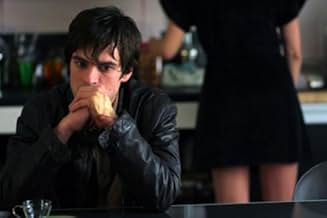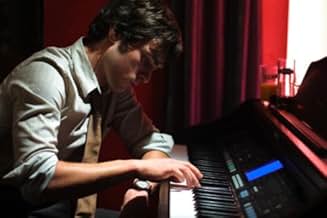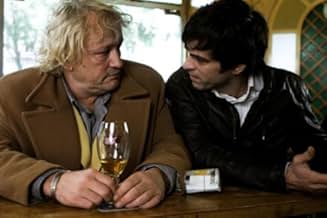Will Thomas condurrà ancora una vita di criminalità e crudeltà, proprio come suo padre criminale, o perseguirà il suo sogno di diventare un pianista?Will Thomas condurrà ancora una vita di criminalità e crudeltà, proprio come suo padre criminale, o perseguirà il suo sogno di diventare un pianista?Will Thomas condurrà ancora una vita di criminalità e crudeltà, proprio come suo padre criminale, o perseguirà il suo sogno di diventare un pianista?
- Regia
- Sceneggiatura
- Star
- Ha vinto 1 BAFTA Award
- 22 vittorie e 14 candidature totali
Recensioni in evidenza
Jacques Audiard, not the most famous but certainly one of the most talented french directors of the last ten years, has remarkably transcribed the mythology and some of the most eminent film-noir themes onto the modern era. The framing, lighting, music (especially its juxtaposition), mood and plot development are spot-on while the main performance my Romain Duris is career defining. The film stands out as one of the best modern neo-noir -a film with a rather singular style, akin to the director's equally commendable previous works.
Thomas (Romain Duris) is a very unsavory young man. His job is a sleazy one--he dispossesses squatters from apartments. In France, it is NOT easy to legally dispossess these folks--so Thomas and his thuggish friends beat the crap out of them or toss rats into the apartments to get the folks to leave. It seems that Thomas learned a lot from his ne'er do well father. However, hidden within is a part of his dead mother. The woman was a concert pianist and Thomas had this as his career goal as well. And, when Thomas happens to see his mother's old manager, the dream of being a respected pianist reignites within him. But just practicing the piano and improving his skills isn't enough- -he must decide if he wants to become respectable or remain a thug. Through much of the film, Thomas bounces back and forth between the two extremes. Where will Thomas eventually land?
The film is much better than the other films mentioned because Thomas' journey wasn't fast and his change wasn't complete and magical. In the other films, the problem was just too black and white and the changes unrealistic. Here, however, with a better script and a really nice performance by Duris, you've got a really compelling film. My only reservation is that this is NOT a film for everyone--it's very violent, sexual and not a neat picture that follow the expected formula. Well worth seeing regardless.
As a character study of Thomas, the film somewhat succeeds in presenting his ambivalence as a petty criminal and as a frustrated pianist that is trying to regain his skill in playing the instrument. Thomas is, from all accounts, an ugly character that will engage in all kinds of under handed situations in order to make a living. Most of the motivation in Thomas' actions is driven by his loyalty to his small crook father, who is constantly nagging him to take care of the old man's criminal activities as well.
In Romain Duris, director Audiard gets a multi layered performance that is what keeps the film going. Mr. Duris, an intense actor, is the dominant figure in the movie, and perhaps the excuse for seeing the film. Nils Arestrup, as the father, has also some good moments.
Based on a flop more admired in France than the US, James Toback's 70's Harvey Keitel vehicle about a violent would-be pianist, "Fingers," this compulsively watchable, thrillingly accomplished new movie by Jacques Audiard ("De Battre mon cur s'est arrêté", still showing in Paris as it opens here) echoes his previous compellingly offbeat "Read My Lips" in grafting together two separate moral universes. Read My Lips depicted the odd alliance of a firecracker ex-con (Vincent Cassel) and a mild-mannered but angry hearing-impaired office worker (Emmanuelle Devos). It was an intriguing piece -- but seems low energy in retrospect compared to this. Audiard has made a powerful actors' movie in which Duris blooms, a powerful actor now, playing in effect both the Cassel and the Devos parts and acting out the resulting implosion of violence and frustrated artistic passion with astonishing zest. It's hard to believe he was the tame college student narrator of Klapich's "L'Auberge espagnole" three years ago.
Duris as Tom is good-looking but vaguely burnt-out, his eyes a bit crazy, his hair neatly coifed, his jaw firm, has mouth a smiling snarl. The camera is on that square jaw every minute. Uniformed in boots, smart pants, tie and trim leather jacket, he's an elegant young hoodlum who can switch to a dark suit for a real estate hearing or audition, or wipe the blood off his cuff to enter a café or concert hall. He's angry all the time but brings vibrant energy to both of his conflicting lives. Tom finds a beautiful long-haired young master pianist called Miao Lin (Linh Dan Pham) to coach him in piano. These encounters with the keyboard he approaches like a prize fighter going at a punching bag. If he's an artist it's the hairy-chested, coiled, macho kind. How can you teach anybody pianistic excellence? The impossibility of the process is signaled by the teacher's speaking no French. She harangues Tom in Vietnamese, or just says in English over and over, "again" Or "no." Or "no smoking allowed." A cup of tea in the kitchen at end of session. Tom goes at the same piece over and over, a Bach Toccata. This relationship is an "oasis of calm" in Tom's otherwise 'loca' 'vida' -- the contrasts in such a piece as this are telegraphed without much subtlety -- but the unconventionality of the pair helps the scenes to avoid cliché. And the intensity is just as focused in these quiet moments.
There are other strong relationships. Tom isn't isolated; he works with partners, one of whom uses him to hide his two-timing from his wife. Arestrup, who looks like a French version of late Brando, is superb as the blowsy, burnt out father, a big sensualist, an irresistible presence, always smoking drinking and eating, soft but nasty, irritating but impossible for Tom not to love and protect. Tom pursues Minskov (Anton Yakovlev), a Russian Mafioso his dad has tangled with, and winds up sleeping with Minskov's French girlfriend as well as somebody else's wife. Every encounter he has is reckless and intense. Duris doesn't fail us in any of this. Emmanuelle Devos is his dad's new girlfriend, whom Tom first calls a whore and rejects and then wants to hire on to calm things on the home front. Where's it all going to end? Despite all that's going on, as one French critic said, "there's no fat" in this picture. The pushes and pulls of the hero's dilemma make for fabulously kinetic editing and the action never goes soft. A final sequel resolves things. Some say it's milder than the American version, but that's overlooking the visceral punch of the action throughout. The dialogue underlines that just as in Read My Lips, people aren't communicating too well. It may be music is all that links them.
The shortcomings of such a movie are its simplifications. The crooked real estate life like the classical pianist life can be no more than impressionistically dabbed in. And there's an occasional danger that Romain Duris -- who studied piano for months with his pianist sister for the keyboard sequences -- may be trying too hard sometimes. Since Tom also loves electro which he listens to with big headphones in his car -- as the word is Duris himself does -- classical music maybe doesn't grab the film as wholeheartedly as it ought to. You can't expect profundity but from the sound of "Fingers," this is more accomplished film-making. It may not have as much conviction, but this is wildly entertaining. And more than that, it's a movie where everything comes together, scenario, actors, editing. Audiard, who showed us dark secret places last time, now reveals himself a virtuoso of violence and passion.
Lo sapevi?
- QuizRomain Duris's sister is a pianist, and she is the one who taught him to play piano for this film.
- Citazioni
Sami: Playing piano is making you flip. Stop it now!
Thomas Seyr: Nothing's making me flip. I'm not flipping. I'm having a ball. I feel fantastic, dont' you see? It's important, I'm serious about it.
Sami: You gonna make dough from pianos?
Thomas Seyr: Not pianos, the piano! It's not about making money, it's about art.
Sami: What's in it for us? You coming to meetings all, 'Hi guys, I've been playing piano.' Shit, I'll take up the banjo.
Thomas Seyr: It's over your head
- ConnessioniRemake of Rapsodia per un killer (1978)
I più visti
Dettagli
- Data di uscita
- Paese di origine
- Siti ufficiali
- Lingue
- Celebre anche come
- The Beat That My Heart Skipped
- Luoghi delle riprese
- Aziende produttrici
- Vedi altri crediti dell’azienda su IMDbPro
Botteghino
- Budget
- 5.300.000 € (previsto)
- Lordo Stati Uniti e Canada
- 1.023.424 USD
- Fine settimana di apertura Stati Uniti e Canada
- 65.365 USD
- 3 lug 2005
- Lordo in tutto il mondo
- 11.757.109 USD
- Tempo di esecuzione
- 1h 48min(108 min)
- Colore
- Mix di suoni
- Proporzioni
- 1.85 : 1






























